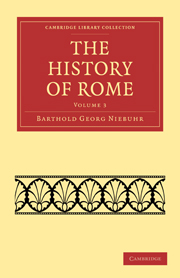Book contents
- Frontmatter
- PREFACE
- Contents
- The Licinian Rogations
- The new curule Dignities of the year 384
- Internal History down to the complete establishment of the plebeian Consulship
- On the Uncial Rate of Interest
- History of the Wars from 384 to 406
- Rome in Alliance with Latium
- The earliest Constitution of the manipular Legion
- The first Samnite War
- The Latin War
- The Laws of the Dictator Q. Publilius
- Internal History down to the Caudine Peace
- Alexander of Epirus
- Forein Relations down to the second Samnite War
- The second Samnite War
- Relations between Rome and the Nations bordering on Samnium after the Peace
- The Etruscan Wars down to the beginning of the third Samnite War
- Internal History from the Caudine Peace down to the third Samnite War
- Cn. Flavius
- The Censorship of Q. Fabius and P. Decius
- The Ogulnian Law
- Various Occurrences of the same Period
- The third Samnite War and the Others of the same Period
- Internal History from the Beginning of the second Samnite War down to the Lucanian
- Miscellaneous Occurrences of the same Period
- The Etruscan and Gallic War
- The Lucanian, Bruttian, fourth Samnite, and Tarentine Wars
- Epirus and Pyrrhus
- The Roman and Macedonian Tactics
- The War with Pyrrhus
- Entire Subjugation of Italy, and the Political Rights of the Italian Allies
- Internal History and Miscellaneous Occurrences of the Period from the Lucanian down to the first Punic War
- The first Punic War
- Index
- ERRATA
Internal History down to the complete establishment of the plebeian Consulship
Published online by Cambridge University Press: 01 June 2011
- Frontmatter
- PREFACE
- Contents
- The Licinian Rogations
- The new curule Dignities of the year 384
- Internal History down to the complete establishment of the plebeian Consulship
- On the Uncial Rate of Interest
- History of the Wars from 384 to 406
- Rome in Alliance with Latium
- The earliest Constitution of the manipular Legion
- The first Samnite War
- The Latin War
- The Laws of the Dictator Q. Publilius
- Internal History down to the Caudine Peace
- Alexander of Epirus
- Forein Relations down to the second Samnite War
- The second Samnite War
- Relations between Rome and the Nations bordering on Samnium after the Peace
- The Etruscan Wars down to the beginning of the third Samnite War
- Internal History from the Caudine Peace down to the third Samnite War
- Cn. Flavius
- The Censorship of Q. Fabius and P. Decius
- The Ogulnian Law
- Various Occurrences of the same Period
- The third Samnite War and the Others of the same Period
- Internal History from the Beginning of the second Samnite War down to the Lucanian
- Miscellaneous Occurrences of the same Period
- The Etruscan and Gallic War
- The Lucanian, Bruttian, fourth Samnite, and Tarentine Wars
- Epirus and Pyrrhus
- The Roman and Macedonian Tactics
- The War with Pyrrhus
- Entire Subjugation of Italy, and the Political Rights of the Italian Allies
- Internal History and Miscellaneous Occurrences of the Period from the Lucanian down to the first Punic War
- The first Punic War
- Index
- ERRATA
Summary
Though a firm hand had secured the promist benefits, yet nothing but time and the gentle force of habit could establish a sincere peace between two orders, which had now past over to a state of equality from one of longstanding oppression and insult. The blindness of the patricians prevented them from perceiving, how vain their attempts were, to recover their lost privileges: it was necessary that such attempts should become dangerous to them, before the republic could enjoy internal peace with freedom. Before this object was attained, five and twenty years past by in supprest but violent agitations.
After the revolution, which had become possible through external peace, there followed an unusual calm, while the government was wholly engaged in carrying the laws into effect. It may also be true, that the senate did not wish for any war, in order to keep the plebeian consul in inglorious inactivity. Natural events of a destructive kind prevented this tranquillity from restoring the republic to health: a pestilence raged: and the river overflowed the low districts. But so changed was the general feeling in little more than one generation, that now the comitia could not be disturbed by the pretended indignation of the gods at the election from unworthy houses. The fourth year was already passing away without war: and now there ripened in the patricians the scheme for putting a stop to the operations of the Licinian law by the old terrours of the dictatorship, and by a forced levy of troops.
- Type
- Chapter
- Information
- The History of Rome , pp. 45 - 53Publisher: Cambridge University PressPrint publication year: 2010First published in: 1842



